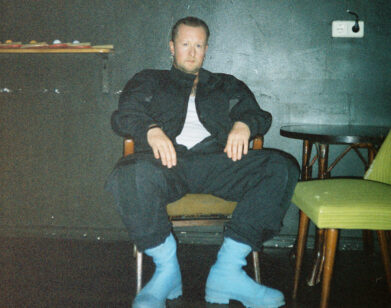Patrick Wolf Sings a Happy Tune

PHOTO COURTESY OF RYAN MCGINLEY
British singer-songwriter Patrick Wolf, pop music’s resident virtuoso, has never been so happy in his life. Known for songs like “Battle,” from 2009’s The Bachelor, an electro-rock song in which Wolf challenges his listeners to battle for equal rights and urges them to take down conservatives and homophobes, the theme on Wolf’s latest release is much sweeter: make love, not war. On “House,” to take one example from the new album, Wolf sings “Oh, I love this house, I love this house. Gives me the greatest peace I’ve ever known.” Lupercalia, named after an ancient festival of love, is out now on Hideout/Mercury Records, and represents Wolf’s major-label debut, a soaring and optimistic collection of pop anthems destined for die-hard Patrick Wolf fans—as well as the mainstream.
The flamboyant Wolf, who stands a full 6-foot-4 and had his first major growth spurt at the ripe age of 12, plays more than 20 instruments, seven of which appear on Lupercalia. His use of real instruments lends his songs a compositional, chamber-music voice. We caught up with Patrick on the eve of the UK release of Lupercalia and chatted about selling out, happiness, getting bored with instruments, and why he didn’t just make a dance record.
MADISON MOORE: Where are you right now?
PATRICK WOLF: I’m in my house at the moment. I’m throwing a big party today for all my crew and the label and everybody that’s been involved in helping make this record. I brought an amazing cabaret band for later on, so there’s going to be a big party—it’s going to be a really great week. A whirlwind—a “Wolf Whirlwind.” [laughs]
MOORE: It’s interesting you’re having a grand celebration for an album that’s essentially about celebration and happiness.
WOLF: Yeah. It’s that age-old cliché, “If you give a lot of love, it all comes back to you.” Waking up and doing the shows, I just come away with a lot better taste in my mouth and a lot better feeling in my heart, like I’ve done something rather than just wallow in misery.
MOORE: And yet your last record, The Bachelor, was more aggressive than Lupercalia. Do you see this presentation of a newer, happier Patrick as a continuation from the last album?
WOLF: Well, I think that it’s a continuation from the last, yeah. The last song on The Bachelor was “The Messenger,” and it was kind of me throwing myself into the open road and not really having any idea about love or romance coming next. It was just me saying, “Well, if I don’t have love or romance in my life, I’ll have my love of traveling, and I’ll just be a hitchhiker and travel and be with my music.”
MOORE: But then you fell in love and everything changed.
WOLF: Yeah, and then suddenly I fell headfirst into love, and that was the next chapter of the book. And so it’s a very honest representation of a period of my life where I’ve kind of been celebrating focusing on intimacy and love, being less selfish and sharing my life with somebody. Protecting somebody, looking after them, cooking for them, doing the more selfless things in life.
MOORE: How did you decide on Lupercalia as the title?
WOLF: Well, I was looking for a word that summed up a festival of love, a period in life that you celebrate love. And that was this ancient festival where people would just celebrate—it was for fertility. It was equal to falling in love, matchmaking, and it was in all honor of a wolf, so I thought it was the perfect title.
MOORE: Previously you’ve collaborated with Patti Smith, Tilda Swinton, and even Mario Testino for the Burberry campaign you appeared in with Agyness Deyn. Are there any collaborations on this record, or any other collaborative projects coming up?
WOLF: The biggest collaboration was probably between me and my orchestral arranger, Fiona Brice. We spent many late nights on Skype—she was on tour with Placebo and living in America. Anyway, there was a big wind section to score, and then a brass section, a choral section, and a string section. So it’s quite a lot of work; I guess that’s the biggest collaboration on it. I kind of wanted to make a pure record with one voice, one continuous voice from beginning to end rather than be distracted with ephemeral voices. The Bachelor was really heavy on that. “House,” from the new record, was originally going to be a duet with Florence Welch, but then it was more like, this is an album that doesn’t need any duets. It needs to be a single voice, and I felt like I hadn’t done that since Wind in the Wires.
MOORE: Speaking of voice, you sure play a lot of instruments!
WOLF: I get bored with instruments, and then they end up just being put in storage. The greatest thing I’ve done on this album is the cristal baschet, which is an old instrument made out of crystal rods, glass rods, and water. It’s a turn-of-the-century instrument, and I found one of the other three people in the world who could play it. And that’s about getting back to organic, human sounds. I wanted to move away from ProTools and digital and electronic noises, so everything has an analog, warm heart to it, which kind of relates to the intimacy of the lyric.
MOORE: One thing that differentiates you from the broader pop music landscape is that your music is more like chamber pop—chamber music with a pop sensibility, or pop music with a chamber feel.
WOLF: When I was in America and listening to the radio there, I was having a slight identity crisis. I’m known as somebody that can reinvent myself and do anything I want next, and what would I do next? It would have been very easy to do a dance record, a kind of… [sings] “Be in the club, in the club.” [both laugh] You know, that kind of stuff. It’s so easy to make that music. So at first I started making some dance music, but then I thought, “Why am I doing this dance music when my skill and forte is to be organic and use real instruments and not use Auto-Tune?” Maybe it’s okay to be the other voice away from the whole digital, robotic radio production that’s kind of going on at the moment. It took a bit of courage to step away from that.
MOORE: This is your major-label debut. Do you worry your die-hard fans will call you a sellout?
WOLF: I’m not soft, really. I’m so happy with what I’ve just made. And actually, I was worried a little bit that I would lose the people that I really love in my crowd. But I’ve always known my audience to be open-minded, wanting to be shown something new. And, yeah, for sure on the other albums I’ve nourished people’s pain and touched on that, but times are hard in the world and I really wanted to say instead, “Let’s look to each other and be more romantic and come together and really get closer to human beings.” I think that’s a nicer way to go forward at the moment. While the world is at war, I don’t really want to be at war as well, you know?
LUPERCALIA IS OUT NOW. FOR MORE ON PATRICK WOLF, VISIT HIS WEBSITE.






